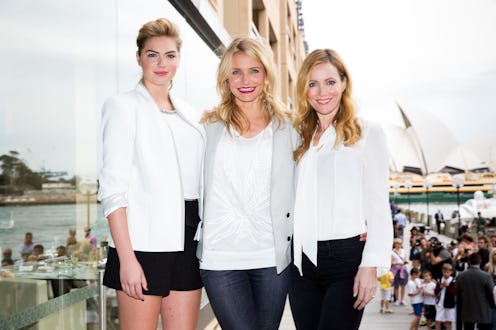Usually, a female-driven comedy heading to theaters would be reason to celebrate. The Other Woman, starring Leslie Mann, Cameron Diaz and Kate Upton, is one of the few female-lead movies to premiere this spring, but based on its marketing campaign, there isn't much to be excited about. 20th Century Fox has included a ton of emojis in The Other Woman 's publicity materials and effectively turned what could have been a cute, funny promotion into an offensive, pandering campaign.
It all started with "the world's first emoji trailer," a new version of The Other Woman's original trailer that added text-like bubbles to the bottom of the screen, where emojis translated what was occurring in the trailer. It was actually pretty clever. Without changing the actual footage, the movie got a fresh new trailer that drew attention, thanks to the popularity of emoji versions of TV shows and movies. If only Fox had stopped there.
Next came an emoji version of The Other Women 's poster, which used emojis to form the movie's brass knuckles logo and even substituted the symbols for some parts of the casts' names and movie tagline. The brass knuckles are made of a variety of emojis, with an abundance of yellow faces, bikinis, dancing ladies and hearts.
The addition of the poster raises some questions. What's with the focus on emojis? Is Fox simply trying to tie the poster into the trailer or if there a real reason for their emphasis on the texting symbols? We were ready to give them the benefit of the doubt, until we saw The Other Woman 's official website.
There, alongside gifs and stills from the movie, are character posters, pointed out by Bobby Finger, that use emojis to illustrate the character's personalities and moods, and at the same time, reveal the likeliest explanation behind Fox's marketing strategy.
Women love emojis, right? It seems that with this overreaching idea, Fox is hoping to strike a chord with the women they want to see this movie, you know, the average lady who can't complete a texted sentence without throwing in a mood-describing yellow circle. Need some more proof of their generalizing strategy? They also added some abbreviations, because we all know girls never use full words.
It seems that in their efforts to connect with a young, female audience, Fox completely insulted that entire demographic, offensively pandering to what they assume are those women's interests. It's not just these women who should be upset. In some posters, The Other Woman's actresses are compared to emojis, taking the ads to a whole new level of offensive.
It's not the inclusion of emojis that is offensive, but the way they are used. A lot of people use emojis and enjoy seeing them used in creative ways, like Brooklyn Nine-Nine's Gina adding them to her speech, and The Other Woman's trailer. But using emojis so prominently in so many different materials takes it from creative to offensive and frankly, annoying.
It's not only women who use emojis, and not all of the women who do are so obsessed with them that they need emojis to explain movies and characters to them. If Fox thinks revealing Kate Upton's character's "VIP Emoji" is a hand holding up two fingers will get women to see her movie, what does Fox think about women?
We don't need to be pandered too. We're perfectly capable of reading full words and understanding human emotions without the aid of emojis. And emojis alone aren't enough to convince us to see your movie. In fact, they may have done the opposite.
Rather than highlight the The Other Woman's female friendships and comedy, Fox used what it saw as the lowest common denominator among women, emojis and abbreviations—sorry, abbrevs. Whether the movie itself is empowering, or at least unoffensive, remains to be seen but after this campaign, many women might not even give it a chance.
Images: 20th Century Fox
